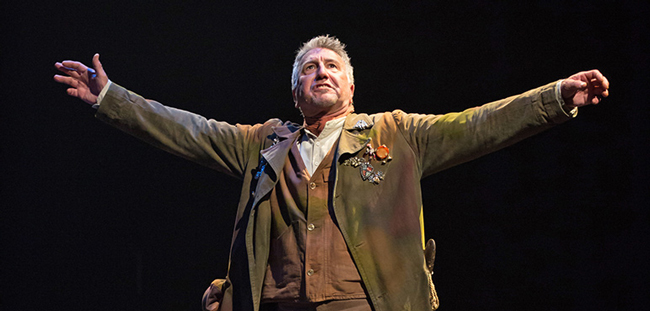
Scott Wentworth is a Tony and Olivier-nominated theatre artist whose work has been celebrated on Broadway, in London’s West End, on television, in films and in theatres across the U.S. and Canada. Mr. Wentworth has been performing and directing at the Stratford Festival for over 20 seasons over the last 30 years.
His recent work includes directing the 2017 Stratford Festival production of Romeo and Juliet and playing the Ragman in The Madwoman of Chaillot. Stratford performances include the title role in last season’s John Gabriel Borkman, Gloucester in King Lear, Tevye in Fiddler on the Roof, Shylock in The Merchant of Venice, Sky Masterson in Guys and Dolls, Iago in Othello and the title role in Macbeth.
At Stratford, Mr. Wentworth directed the 2001 productions of Henry IV, parts 1 and 2, and the 2015 production of The Adventures of Pericles. Elsewhere his directing credits include Richard III (Bard on the Beach), Love’s Labour’s Lost (Shakespeare Santa Cruz), Much Ado About Nothing (Shakespeare Theatre of New Jersey), and Romeo and Juliet (Denver Center). In January 2018, Mr. Wentworth will be starring in Harold Pinter’s The Birthday Party at the American Conservatory Theater in San Francisco.
Friends of the McGill Library in collaboration with the Stratford Festival will present the annual Shakespeare Lecture featuring Scott Wentworth on Tuesday, Nov. 7, at 6 p.m. in the Leacock Building, Room 26. RSVP required. Reserve your spot online or call (514) 398-5711. In his talk titled “Julius Caesar” Before The Rehearsal Room, Wentworth will focus on the director’s work before the first day of rehearsal. From studying the play, to working with designers and composers, what does the director do in preparation for meeting the actors?
This season you directed Romeo and Juliet. What’s challenging about bringing a script like Romeo and Juliet to life?
The biggest challenge was breaking down the traditions that have grown up around the play and hearing the play itself.
How can theatre practitioners make Shakespeare relevant to young audiences?
I think Shakespeare is always relevant because his articulation of humanity is so precise. Sometimes we in the theatre limit the plays or put a spin on them and young people especially can sniff out that kind of fakery.
What Stratford moment (in the director’s chair or on stage), has deeply affected you personally, perhaps even changed you in a permanent manner.
I’m not really dodging the question but I can honestly say that every day I go to work I am profoundly changed by encountering these great works of art.
Give us a taste of what you will be exploring in the lecture. As a director, how do you begin the creative process once you receive the script?
I read the play. I read the play. And then I read the play some more. I’m not looking for answers, I’m looking for questions. Ultimately the actors will have to answer them. So the more questions I can bring into the rehearsal room the better.
How do you create a work-life balance for yourself?
I don’t think of it as something that needs balancing. My work informs my life, my life informs my work. It’s really two ways of describing the same experience.
